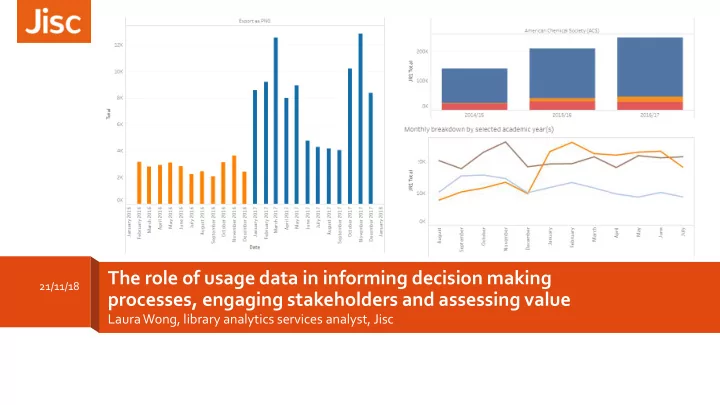

The role of usage data in informing decision making 21/11/18 processes, engaging stakeholders and assessing value Laura Wong, library analytics services analyst, Jisc
Why use e-resource usage data? E- resource usage data provides… » evidence to back up decisions and support cases » metrics used in reporting and monitoring » additional source of information which then enables and supports… » informed collection development decisions » informed discussions » new insights and a different perceptive 21/11/18 2 UKSG E-Resources for Further Education
Analysis and interpretation » Stats need to be interpreted to provide useful information » What is being counted? What is the unit of use? › click, download, search, view etc. » What does that count mean? › Add context › Make comparisons » Not used in isolation – usage data needs to be used alongside other data, information and knowledge 21/11/18 3 UKSG E-Resources for Further Education
Informing decisions What to buy, what to keep and what to cancel Trends Cost-per-use Access or cost-per- denials download Purchasing and renewal decisions 21/11/18 4 UKSG E-Resources for Further Education
Engaging stakeholders Inform discussions with suppliers Open Regular dialogue with reporting to lecturers management Building relationships with stakeholders 21/11/18 5 UKSG E-Resources for Further Education
Feedback and evaluation Access issues Under High use used titles titles Delivering the best service 21/11/18 6 UKSG E-Resources for Further Education
Impact and value Value of Making a your case service Reporting Evidence Demonstrating impact and value 21/11/18 7 UKSG E-Resources for Further Education
JUSP case study Using JUSP to improve collection management and strategy » Regularly collected and monitored usage but asked could we make better use? » Systematic journals review › Identified low use titles for review › Calculated cost per use › Considered factors such as impact, subject, cost and format › Consulted with academics » Saved money and re-allocate budget to more relevant resources » https://jusp.jisc.ac.uk/docs/case5.pdf 21/11/18 8 UKSG E-Resources for Further Education
JUSP 21/11/18 9 UKSG E-Resources for Further Education
Practical challenges of working with usage data Challenges JUSP Collects on behalf of libraries Collection – time and effort required to collect data Single point of access Collation – time and effort required to process data for analysis Aggregates and summarises Supports Jisc Collections Consistency – reliability of data Standards based (COUNTER) Central point of contact, expertise and support Context – combining and matching with other information Export data Core journal titles and KB+ Usage profiling/benchmarking Communication – engaging others Community, support and training Data visualisations 21/11/18 10 UKSG E-Resources for Further Education
Further information about JUSP » Joining information - http://jusp.jisc.ac.uk/join/uk-academic-libraries/ » Can JUSP help? - http://jusp.jisc.ac.uk/docs/Can_JUSP_help.pdf » Use cases - http://jusp.jisc.ac.uk/use-cases/ » Case studies - http://jusp.jisc.ac.uk/case-studies/ » Video guides - http://jusp.jisc.ac.uk/screencasts/ » Webinars and slides - https://jusp.jisc.ac.uk/events-training/ › JUSP for further education - 16 Jul 2018 21/11/18 11 UKSG E-Resources for Further Education
Contacts Any questions about JUSP Any other questions about Jisc and Jisc services » help@jisc.ac.uk » Contact your Jisc account manager » Mention JUSP » https://www.jisc.ac.uk/contact /your-account-manager 21/11/18 12 UKSG E-Resources for Further Education
Recommend
More recommend